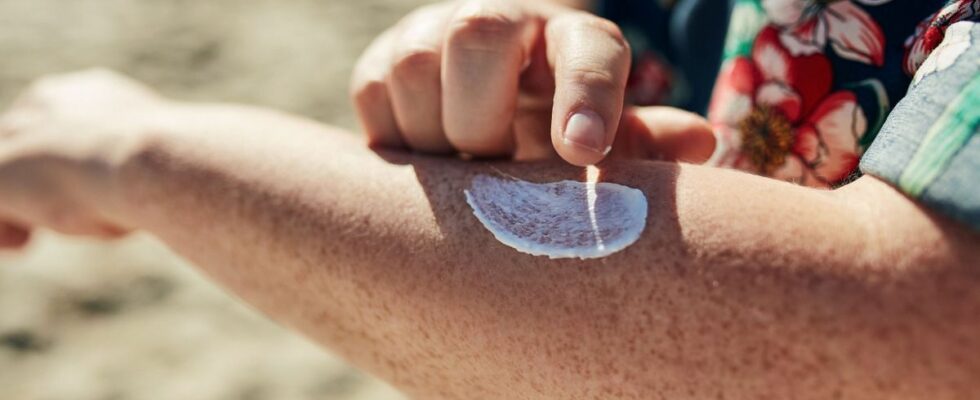Published on
Updated
Reading 3 min.
Throwing a tube over his shoulder, shirtless influencer Jerome Tan tells his 400,000 TikTok followers point blank: sunscreen “causes cancer,” so opt for “regular exposure to the sun.”
This “transformation coach” is not the only one to advocate such a practice, which has caused concern among health experts in the United States, against a backdrop of increasing skin cancers.
As the United States endures a record heat wave, this type of misinformation about sunscreen undermines public health advice and poses real danger.
Some videos with millions of views share “homemade” sunscreen recipes, mixing beef fat, avocado butter or even beeswax.
In his video, which has gone viral on TikTok with over 430,000 views, Jerome Tan claims to his followers – without any scientific basis – that eating natural foods will allow the body to make its “own sunscreen”.
Nearly one in seven American adults under age 35 believe that daily sunscreen application is worse for their health than direct exposure to the sun, according to a survey this year by the Orlando Cancer Institute. Nearly a quarter of respondents said that staying hydrated helps prevent sunburn.
“People are buying into a lot of really dangerous ideas.“, warns Rajesh Nair, a surgical oncologist at the institute in Florida.
No “safe tanning”
Another survey shows that 75% of Americans use sunscreen regularly, a four-point drop from 2022.
Results that converge with other trends showing an increase in the general public’s distrust of public health advice – vaccines and the fight against Covid-19 in particular.
Some influencers – often devoid of any scientific expertise – are making money from these trends.
Dermatologists would therefore like to debunk the myth that regular exposure to the sun is good for your health.
“There is no such thing as safe tanning“, Daniel Bennett, a dermatologist and professor at the University of Wisconsin, told AFP.
“The evidence that exposure to ultraviolet light is the leading cause of skin cancer is overwhelming.” he adds.
Most false or misleading content comes from influencers seeking financial gain on social media, other experts say.
Some designers are exploiting “scepticism about sunscreen” to “sell their own products,” Eric Dahan told AFP.
The founder of Mighty Joy, an influencer marketing agency, cites an Instagram post that advises against “constantly applying sunscreen” while promoting skincare products.
Burns, aging and cancer
“Say goodbye to sun paranoia,” the post in question reads, with plenty of emojis. “Catch some rays (guilt-free) this summer.”
Shirtless and with a surfboard under his arm, another Instagram influencer urges his followers to ditch sunscreen.
“Do I worry about skin cancer? No“, he says happily, highlighting the benefits of beef tallow.
But this product, obtained by rendering beef fat, has no properties that allow it to block ultraviolet rays, explains Megan Poynot Couvillion, a dermatologist in Texas.
“I don’t see any problem using it on the skin as a softener but definitely not as sunscreen.” she says.
The American Academy of Dermatology says homemade sunscreens are “are devoid of effective protection against the sun“, exposing their users to risks of burns, premature skin aging and cancer.
And while some of these recipes do include some classic sunscreen ingredients like zinc oxide, the vast majority of the public does not have the technology to test the benefits of these mixtures against ultraviolet rays at home, says Adam Friedman.
For this professor at the George Washington University School of Medicine, it is simply impossible to make a good sunscreen “in your basement.”
